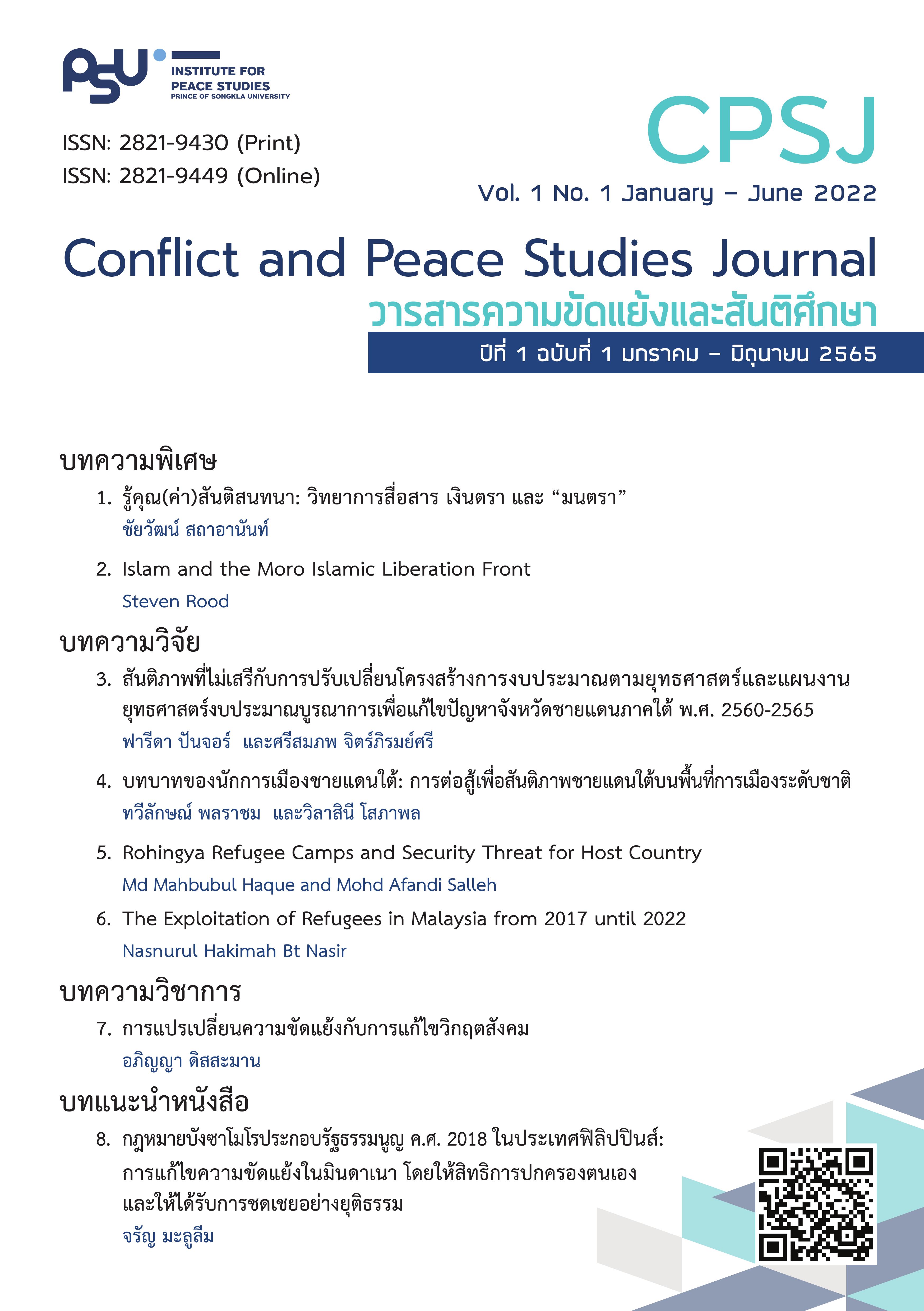The Roles of Politicians in the Deep South: Fighting for Peace in the Southern Thailand at the National Political Level
Main Article Content
Abstract
This article examines the roles of Deep South politicians in national politics through parliamentary mechanisms in fostering peace in their communities. This study adopted in-depth interviews with six politicians in the southern-border region. It is found that the politicians in the context of the democratic public sphere have practiced non-violent political contestations. The politicians have two roles which are reflecting people’s voices and promoting peace through the legislative reforms.
The findings indicated politicians in Thailand's southern-border provinces prioritize unheard people's voices as significant issues of their interests. Furthermore, politicians in the region collaborate to push for the abolition of martial law. On the other hand, they continue to face challenges at work, such as the neglect of parliament and political polarization, both of which have a negative impact on policy deliberation. Additionally, it was revealed that Deep South politicians play minimal roles at the peace negotiating table.
Article Details
References
Arpornsuwan, T. (2007). The Background of the separatist theory in southern Thailand. Bangkok: Social Sciences and Humanities Textbooks Foundation.
Bonnar, A. (2009). The Role of Grassroots Women Peacebuilders in Southern Thailand. [MA Thesis, Royal Roads University] available at https://central.bac-lac.gc.ca/.item?id=MR61774&op=pdf&app=
Library&oclc_number=1019464666 (accessed 16 April 2022)
Buranajaroenkij, D. et al. (2017). Women at a Periphery of the Deep South Peace Process: A perspective of Female Victims of Violent Conflict. Journal of MCU Peace Studies, 5(1), 14-27.
Carothers, T. (2006). Confronting the Weakest Link: Aiding Political Parties in New Democracies. Washington, DC: Carnegie Endowment for International Peace.
Casperson, N., & Sindre, G. (2020). Supporters, spoilers or sidelined: the role of parliament in peacebuilding. 30 November, available at https://www.agora-parl.org/blog/supporters-spoilers-or-sidelined-role-parliaments-peacebuilding (accessed 10 April 2022)
Castilejo, C. (2016). Political Parties and Peacebuilding. Report Norwegian Peacebuilding Resource Center.
Galtung, J. (1976). Peace, War, and Defense. Essays in Peace
Juenana, R. (2017). The Roles of the Network of Civic Women for Peace in Organizing Dialogue for Peacebuilding in Three Southern Borders’ Provinces of Thailand. MA (Conflict and Peace Studies) Thesis, Prince of Songkhla University.
Khananurak, N. (2015). Local Politicians in Narathivas province. Bangkok: King Prajadhipok’s Institute.
Makahamadze, T. (2019). The Role of Political Parties in Peacebuilding Following Disputed Elections in Africa. Africa Insight. 142-158.
Mendes, I. (2019). Inclusion and Political Representation in Peace Negotiation: The Case of the Colombian Victims’ Delegations. Journal of Politics in Latin America. 11(3), 272-297.
Peace Survey Academic Network. (2021). The 6th Public Opinion Survey on the Peace Process in the Southern Border Provinces of Thailand. Bangkok: King Prajadhipok’s Institute.
Pluemjai, S. (2017). The Association of Women for Peace with Peace Building in the Southern Border Provinces. MA (Human and Social Development) Thesis, Prince of Songkhla University.
Political Parties of Finland for Democracy. (2019). Political Parties and Peace Building: The Forgotten Stakeholder in Peace Process. Helsinki; Ministry for Foreign Affairs of Finland.
Pollachom, T. (2021). The Participation of Non-Muslim Women in the Three Southern Border Provinces in Peace-Building Process in the Aftermath of the 2004- Unrest. (pp. 73-115). In The proceeding of Multi-Mentoring System (MMS8 in Humanity, Sociology, and Fine Art). Bangkok: Thailand Science Research and Innovation.
Reilly, B. et al. (2008). Political Parties in Conflict-prone Societies: Encouraging Inclusive Politics and Democratic Development. Tokyo: United Nations University. Research, II, pp. 282-304. Copenhagen: Ejlers.
Sahoh, I., & Sattar, Y. (2020). Movement dynamics of Malay Muslim politicians amid violence in the southern border areas. Bangkok: Thailand Science Research and Innovation.
Salae, H. (2010). Muslim women in the midst of conflict: the transition from victims to peace activists. MA Thesis, Chulalongkorn University.
Tuansiri, E. (2019). The roles of local politicians in areas of violence in the southern border provinces of Thailand. Journal of Humanities and Social Sciences, Prince of Songkla University, 25(3), 3-38.
Utrarasin, D. (2018). Voices and Votes Amid Violence: Power and Electoral Accountability in Thailand’s Deep South. [Doctoral Dissertation, The Australian National University], available at https://openresearch- repository.anu.edu.au/handle/1885/162786
Yeema, B. (2012). Local Politicians in Pattani Province. Bangkok: King Prajadhipok’s Institute.

